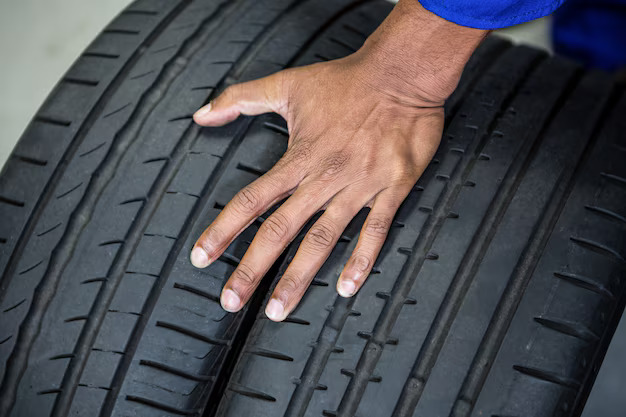Last Updated on July 30, 2025
Maximizing Gas Mileage: How Your Tire Choice Impacts Fuel Costs
The softer the road, the more your car and your tires have to work. Imagine yourself not walking on the highway but walking at the beach. Walking on soft sand takes much more effort than on the boardwalk. As far as your car is concerned, driving on smooth roads is a lot like going on sand, similar to going uphill. It would be best if you had more power to push yourself up the road.
Gas Mileage and Tire Choice
Your tires are the only point of contact between your vehicle and the road. As such, they play a crucial role in determining how efficiently your vehicle moves. Here’s how your choice of tires can impact.
1. Rolling Resistance
Rolling Resistance refers to the force required to keep your tires rolling. Tires with lower rolling resistance require less movement effort, so your engine doesn’t have to work as hard to propel the vehicle. Common rolling resistance tires can improve gas mileage by reducing the energy needed to move the car forward.
2. Tire Tread
The design of your tire’s tread pattern can affect gas mileage. Tires with well-designed treads optimize traction while minimizing Resistance. Overly aggressive or worn-out tracks can increase rolling resistance, reducing fuel efficiency.
3. Tire Inflation
Proper tire inflation is crucial for maintaining optimal gas mileage. Underinflated tires create more rolling Resistance, making your engine work harder and consuming more fuel. Regularly checking and maintaining the correct tire pressure can significantly impact your gas mileage.
4. Weight and Size
The weight and size of your tires can also influence fuel efficiency. Larger and heavier tires require more energy to rotate, decreasing gas mileage. Choosing tires that match your vehicle’s specifications can help maintain optimal fuel efficiency.

Fuel-Efficient Tire Options
Now that we understand the connection between tires and gas mileage let’s explore the options available for maximizing fuel efficiency:
1. Low Rolling Resistance Tires
Low-rolling resistance tires are designed to minimize the effort required for moving. These tires are engineered to reduce friction with the road, resulting in improved gas mileage. They are an excellent choice for drivers looking to boost their fuel efficiency.
2. All-Season Tires
All-season tires offer a good balance between traction, comfort, and fuel efficiency. They are suitable for many driving conditions, making them a versatile choice for many drivers.
3. Proper Tire Maintenance
Proper maintenance is critical to optimizing gas mileage regardless of the tire type. Regularly check and maintain tire pressure, rotate your tires as recommended, and ensure your tires are correctly aligned.
Transforming Roads: The Fuel-Saving Impact of Stiffer Pavement
Civil engineers at MIT have taken that idea a little further. What if we made our roads and highways harder and stiffer?
MIT estimates that if we stiffen the pavement on major roads, we will receive the following benefits per year:
- We can reduce tire wear
- We can reduce fuel consumption by 3%
- We can save about 275 million barrels of crude oil
- We can decrease carbon dioxide emissions by almost 50 million metric tons per year
- We would increase the durability of our roads and save money on repairs
You might not think of asphalt as being all that soft, but your tires on asphalt push down into the road and make a slight indentation as they go. Since they must climb out of that indentation, you drive uphill on asphalt, even when the road is level. It might not be much of a hill, but the environmental and monetary impact it causes is substantial.
Conclusion
Choosing the right tires is crucial to achieve better gas mileage and save on fuel costs. You can significantly impact your vehicle’s fuel efficiency by opting for the correct tire type and considering factors like tread design, tire pressure, and rolling Resistance.
At Tires Easy, we offer many tires to help you get the best gas mileage possible. Upgrade your tires today and experience the benefits firsthand – more miles per gallon and more savings in your pocket.
Make the smart choice for your wallet and the environment with fuel-efficient tires from Tires Easy. Drive farther for less and start your journey towards improved gas mileage today.
FAQs
Do highway tires get better gas mileage?
Highway tires are designed to provide better gas mileage than other tire types. They typically have a tread pattern optimized for smooth, efficient highway driving. The reduced rolling Resistance of highway tires allows your vehicle to move more efficiently, resulting in improved fuel efficiency.
What tires get the best gas mileage?
The best tires for gas mileage are usually low-rolling resistance tires. These tires are specifically engineered to reduce friction and Resistance, helping your vehicle achieve better fuel efficiency. They are an excellent choice if you’re looking to maximize your gas mileage.
Do soft tires affect gas mileage?
Yes, soft or underinflated tires can negatively impact gas mileage. Soft tires create more rolling Resistance, which requires your vehicle to use more fuel to maintain speed. Keeping your tires properly inflated is essential for optimal fuel efficiency.
Do AT tires get worse gas mileage?
All-terrain (AT) tires are designed for off-road capabilities and versatility. While they offer excellent traction and performance on various terrains, they tend to have higher rolling Resistance than highway or low-rolling resistance tires. As a result, AT tires may lead to slightly worse gas mileage, especially on smooth road surfaces.
-
Automotive Specialist
-
Proofreader
-
Writer









